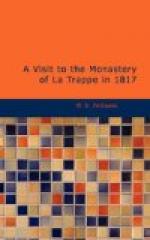At the death of his father, who left an immense fortune to be divided between Mons. Ledru and his two maiden sisters, he took possession of the estate at Fontenay-aux-Roses, from whence he had been cruelly banished when a boy, and which the unkindness of his parent had never after permitted him to enter. Fortune, which had hitherto played a wayward and capricious game with him, had not yet ceased her freaks. In removing a mirror from over a chimney-piece which required an alteration, he discovered a prodigious treasure that had been concealed there by his father! With that generosity and nobleness of character, which make him esteemed and beloved by all his acquaintance, and adored by the whole commune over which he presides, he instantly sent for his sisters and divided it with them. His wife did not long survive this last event, and since her death he has continued to reside at Fontenay-aux-Roses with his sisters, where he exercises his authority with mildness; and by constant acts of beneficence and charity, is justly styled, “Le Pere de Fontenay!”
Between Fontenay-aux-Roses and Paris, to the right of the road, is the village of Gentilly, whose numerous guinguettes are much frequented by the Parisians in fine weather. It being a holyday we met crowds of well dressed citizens, in all sorts of vehicles, driving towards it. An interesting circumstance had been related to me of the cure of this village, M. Detruissart; and on asking permission to visit his rural habitation, I found the story to be true. His garden, which is not above half an acre, has been laid out with such art and ingenuity, as to give an idea of considerable extent, and to add to the charms of this little spot, which he calls his “bonheur,” there are a variety of inscriptions of his own composition; over an arbour of vines is the following:—
MA SOLITUDE.
Loin des mechans, du bruit, des tempetes
du monde,
Sous un simple berceau dont la treille
est feconde,
Sous un modeste toit, dans de rians jardins,
Dessines, eleves, cultives par mes mains....
C’est dans ces lieux cheris que
s’ecoule ma vie
Dans une paix profonde, une tranquillite
Qui sans cesse rappele a mon ame ravie
Le temps de l’age d’or et
ma felicite:
Mais, quelque doux qu’il soit, mon
sort est peu de chose;
Car enfin, apres tout, je dois mourir
bientot!
Ne ressemblons-nous pas a la feuille de
rose
Qui paroit un instant et qui seche aussitot!
It was in the practice of the moral conveyed by these lines, and in the pursuit of literature, and constant acts of charity, that Mons. Detruissart passed his life, which was rewarded by the esteem and affection of all his parishioners, of which they gave a remarkable proof on the 4th of July, 1815, when the Prussian troops took post at Gentilly, from whence they had driven the French the preceding evening into Paris.
The poor cure, with many other of the inhabitants, sought refuge in the capital, leaving his house at the mercy of the enemy, who commenced plundering in all directions; the humble and modest appearance of M. Detruissart’s cottage not attracting their notice, it remained untouched, when a single word from any of the inhabitants would have devoted it to ruin; but such was their esteem for him, that at his return he found every thing as he had left it.




